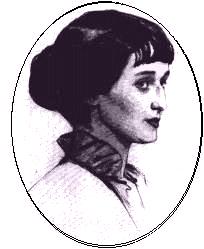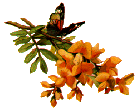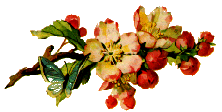

Anna Akhmatova was born Anna Andreevna Gorenko in 1889. She witnessed as a child the reign of the last Russian Tsar, Nicholas II (the father of Anastasia). She was raised in an upper class family in the town of Tsarskoye Selo, near St. Petersburg. She became interested in poetry at an early age. Since at that time writing poetry was not considered "fashionable", her father forced her to take a pen-name. She chose the last name of her maternal Great-Grandmother 'Akhmatova'.
In 1910, Akhmatova married Nikolai Gumilev. Shortly after Gumilev and Akhmatova were married, he left on a journey to Abyssinia, leaving her behind. While Gumilev was away, Akhmatova wrote many of the poems that would be published in 1912 in her first book, Evening.
Akhmatova's first book was wildly popular. She became a cult figure among the intelligentsia, and often read at a cabaret in a St. Petersburg cellar called the Stray Dog Cafe. She became well-known as a part of the St. Petersburg literary scene and remained forever connected with that city. In her early lyric poems she concentrates on love, with a confessional, frank style. Akhmatova was a master of the Acmeist ideals of real experience and clarity. The same year she found success as a poet, her son Lev was born. He was raised by his paternal grandmother, who disliked Akhmatova. Akhmatova protested this situation, but her husband took the side of his family. She would visit with her son during holidays and summer. Later, Akhmatova would write that "motherhood is a bright torture. I was not worthy of it".
Two years later, Akhmatova's second book, Rosary, was published. It, too, was widely read and critically popular. A parlor game based upon the book was even invented. One person would recite a line of poetry and the next person would try to recite the next, until the entire book was recited. Though Akhmatova was enjoying professional success, her personal life was falling apart. Her marriage to Gumilev--in trouble from the start-was failing. They were unfaithful, and Gumilev was jealous of Akhmatova's success.
Anna divorced Gumilev in 1921, but the two poets still remained friends. After the divorce she married Vol'demar Shileiko, the next in a series of failed relationships in Akhmatova's life. He, too, was jealous of Akhmatova's fame. Like many during this time period, they didn't have enough to eat, or enough fuel to keep warm.
In 1921, Akhmatova's ex-husband, Nikolai Gumilev, was arrested and executed for anti-government activities. He was falsely accused of taking part in a plot to overthrow the government. Akhmatova was devastated.
In 1941 Germany declared war on Russia. Akhmatova gave a radio speech in 1941 during the Siege of Leningrad urging the women of Leningrad (formerly St. Petersburg/Petrograd) to be courageous. Even though Akhmatova was forbidden to publish her poems, she was asked by the government to speak because she symbolized Russian culture and was associated with the city of Leningrad. During the war, Akhmatova was evacuated to Tashkent with other writers as well as artists and musicians.
Immediately after the war, Akhmatova enjoyed popularity. In 1946, however, there was an official decree banning publication of her poetry. Andrey Zhadanov, the Secretary of the Central Committee, expelled her from the Writer's Union. Zhadanov called her "half nun, half harlot" and said, "What positive contribution can Akhmatova's work make to our young people? It can do nothing but harm". When Akhmatova was expelled, it meant that her ration card was taken away. The poet had no means of support. She relied on her friends for the rest of her life.
Lev Gumilev, Akhmatova's son, was arrested again in 1949. He was not released until 1956. To try to win her son's release, Akhmatova wrote a few poems in praise of Stalin and the government, but it was of no use. Later she requested that these poems not appear in her collected works.
In 1953 Joseph Stalin died, and Nikita Krushchev became leader. In 1956 Krushchev gave an infamous speech to high ranking Party leaders. He denounced Stalin, calling him a tyrant. That same year, Akhmatova's son was released from prison.
Akhmatova's poetry was again published in 1958 and 1961 but with heavy censorship. Brodsky would later call Akhmatova "The muse of keening".
On March 5, 1966, Akhmatova died peacefully. Akhmatova is considered one of the finest Russian lyric poets, and perhaps the finest female Russian poet of all time. Poetry and the Times.

Crucifix
Do not cry about me, Mother, seeing me in the grave.
I
This greatist hour was hallowed and thandered
By angel's choirs; fire melted sky.
He asked his Father:"Why am I abandoned...?"
And told his Mother: "Mother, do not cry..."
II
Magdalena struggled, cried and moaned.
Piter sank into the stone trance...
Only there, where Mother stood alone,
None has dared cast a single glance.
© Copyright, 1996
Translated from Russian by Tanya Karshtedt,
Edited by Dmitry Karshtedt, August 1996.

Lot's Wife
Lot's wife looked back and turned into a pillar of salt.
Genesis
Holy Lot was a-going behind God's angel,
He seemed huge and bright on a hill, huge and black.
But the heart of his wife whispered stronger and stranger:
"It's not very late, you have time to look back
At these rose turrets of your native Sodom,
The square where you sang, and the yard where you span,
The windows looking from your cozy home
Where you bore children for your dear man."
She looked -- and her eyes were instantly bound
By pain -- they couldn't see any more at all:
Her fleet feet grew into the stony ground,
Her body turned into a pillar of salt.
Who'll mourn her as one of Lot's family members?
Doesn't she seem the smallest of losses to us?
But deep in my heart I will always remember
One who gave her life up for one single glance.
© Copyright, 1996
Translated from Russian by Tanya Karshtedt,
Edited by Dmitry Karshtedt, August 1996

There Are Four of Us
Herewith I solemnly renounce my hoard
of earthly goods, whatever counts as chattel.
The genius and guardian angel of this place
has changed to an old tree-stump in the water.
Earth takes us in awhile as transient guests;
we live by habit, which we must unlearn.
On paths of air I seem to overhear
two friends, two voices, talking in their turn.
Did I say two?...There by the eastern wall,
where criss-cross shoots of brambles trail,
--O look!--that fresh dark elderberry branch
is like a letter from Marina in the mail.

An Epigram
Did Beatrice have Dantesque visions?
Did Laura write Petrarchan sonnets:
I've taught women to speak, O God
But how can I teach them silence?

Other Links on Anna Akhmatova:
Anna Andreevna Akhmatova (1889-1966) Anna Akhmatova Altman, Nathan: Portrait of Anna Akhmatova (1914)